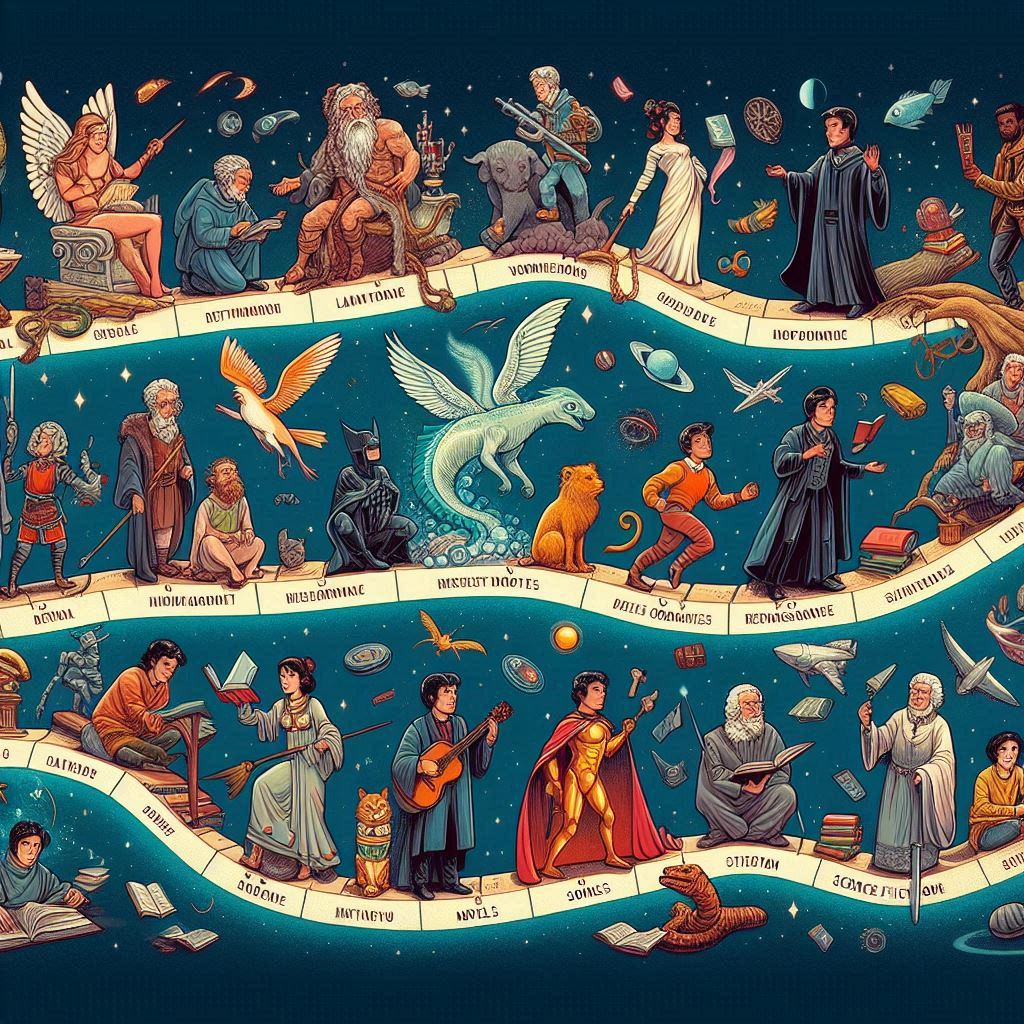Introduction
Literary genres have undergone significant transformations over the centuries, reflecting changes in society, culture, and technology. From ancient oral traditions to contemporary digital narratives, each genre has evolved to meet the needs and interests of its audience. This article delves into the rich history and dynamic evolution of literary genres, examining their origins, development, and the impact they have on storytelling today.
The Origins of Literary Genres
Ancient Epics and Myths
The earliest forms of literature were often oral traditions, including epic poems and myths. Works like “The Epic of Gilgamesh,” “The Iliad,” and “The Odyssey” are foundational texts that explored themes of heroism, adventure, and the human condition. These ancient epics laid the groundwork for narrative storytelling.
Classical Literature
Classical literature, emerging from ancient Greece and Rome, introduced a variety of genres, including tragedy, comedy, and philosophical dialogues. Playwrights like Sophocles and Aristophanes, and philosophers like Plato and Aristotle, created works that would influence literary forms for centuries.
Medieval Romance and Chivalric Tales
During the medieval period, romance and chivalric tales became popular. These stories often focused on knights, love, and adventure, exemplified by works such as “Sir Gawain and the Green Knight” and the Arthurian legends. These narratives combined elements of heroism with moral and ethical lessons.
The Rise of the Novel
Early Modern Novels
The novel as a literary form began to take shape in the early modern period. Works like Miguel de Cervantes’ “Don Quixote” and Daniel Defoe’s “Robinson Crusoe” are considered among the first modern novels. They introduced readers to more complex characters and detailed, realistic settings.
Victorian Literature
The Victorian era saw the novel reach new heights of popularity and complexity. Authors like Charles Dickens, Jane Austen, and the Brontë sisters explored social issues, human relationships, and moral dilemmas. The novel became a primary medium for social commentary and personal expression.
The Advent of Genre Fiction
Science Fiction and Fantasy
The 19th and 20th centuries saw the rise of genre fiction, including science fiction and fantasy. H.G. Wells and Jules Verne pioneered science fiction, while J.R.R. Tolkien and C.S. Lewis laid the foundations for modern fantasy. These genres allowed writers to explore imaginative and speculative worlds.
Mystery and Detective Fiction
Mystery and detective fiction also gained popularity in the late 19th and early 20th centuries. Authors like Arthur Conan Doyle with his Sherlock Holmes stories, and Agatha Christie with her Hercule Poirot and Miss Marple series, captivated readers with intricate plots and clever sleuthing.
Romance and Women’s Fiction
Romance novels became a distinct genre, focusing on love and relationships. Writers like Jane Austen and the Brontë sisters set the stage, while contemporary authors like Nora Roberts and Danielle Steel continue to dominate the market. Women’s fiction often explores broader themes related to women’s lives and experiences.
The Impact of Modernism
Stream of Consciousness and Experimental Forms
The modernist movement brought significant changes to literary genres. Authors like James Joyce and Virginia Woolf experimented with stream of consciousness and other narrative techniques, challenging traditional storytelling methods and exploring the inner workings of the human mind.
Postmodern Literature
Postmodern literature, emerging in the mid-20th century, further blurred genre boundaries. Writers like Thomas Pynchon and Kurt Vonnegut employed metafiction, unreliable narrators, and non-linear narratives, questioning the nature of reality and fiction itself.
Blurring Genre Boundaries
Literary Hybrids and Cross-Genres
Contemporary literature often defies strict genre classifications, resulting in hybrid genres and cross-genre works. Authors blend elements of science fiction, fantasy, mystery, and literary fiction to create innovative and unique narratives that appeal to diverse audiences.
The Influence of Technology on Genres
Digital Literature and E-books
The advent of digital literature and e-books has transformed how stories are consumed and distributed. Online platforms and self-publishing have democratized the publishing process, allowing more voices to be heard and new genres to emerge.
Interactive and Transmedia Storytelling
Interactive and transmedia storytelling involve creating narratives that span multiple media formats, including books, films, video games, and social media. This approach offers immersive experiences and engages audiences in new and dynamic ways.
Globalization and Genre Evolution
Cross-Cultural Influences
Globalization has facilitated the exchange of cultural and literary ideas, leading to the evolution of genres influenced by diverse traditions. Authors from different cultures bring unique perspectives and storytelling techniques, enriching the global literary landscape.
The Future of Literary Genres
Speculative and Emerging Genres
As technology and society continue to evolve, so too will literary genres. Speculative fiction, including sub-genres like cyberpunk and biopunk, explores future possibilities and ethical dilemmas. Emerging genres will reflect the changing world and the new experiences of future generations.
FAQs
How did ancient epics influence modern literature?
Ancient epics introduced foundational themes and narrative structures that continue to influence modern storytelling, including the hero’s journey and the exploration of universal human experiences.
What are some key characteristics of Victorian literature?
Victorian literature often addresses social issues, explores complex characters, and emphasizes moral and ethical dilemmas. It is known for its detailed descriptions and strong narrative voices.
How has technology impacted literary genres?
Technology has enabled new forms of storytelling, such as digital literature and interactive narratives. It has also democratized publishing, allowing for a greater diversity of voices and genres.
What is the significance of cross-genre literature?
Cross-genre literature allows for innovative storytelling by blending elements from different genres. This approach can attract a wider audience and offer fresh perspectives on traditional themes.
How does globalization influence literary genres?
Globalization facilitates the exchange of cultural ideas and storytelling techniques, enriching literary genres with diverse influences and broadening the scope of narratives.
What might the future hold for literary genres?
The future of literary genres will likely see further innovation and blending of genres, influenced by technological advancements and societal changes. Speculative fiction and emerging genres will reflect contemporary issues and future possibilities.
Conclusion
The evolution of literary genres is a testament to the dynamic nature of storytelling. From ancient epics to contemporary cross-genre works, literature has continually adapted to reflect the changing world and the diverse experiences of humanity. Understanding this evolution enriches our appreciation of literature and inspires us to explore new and innovative ways of telling stories.



